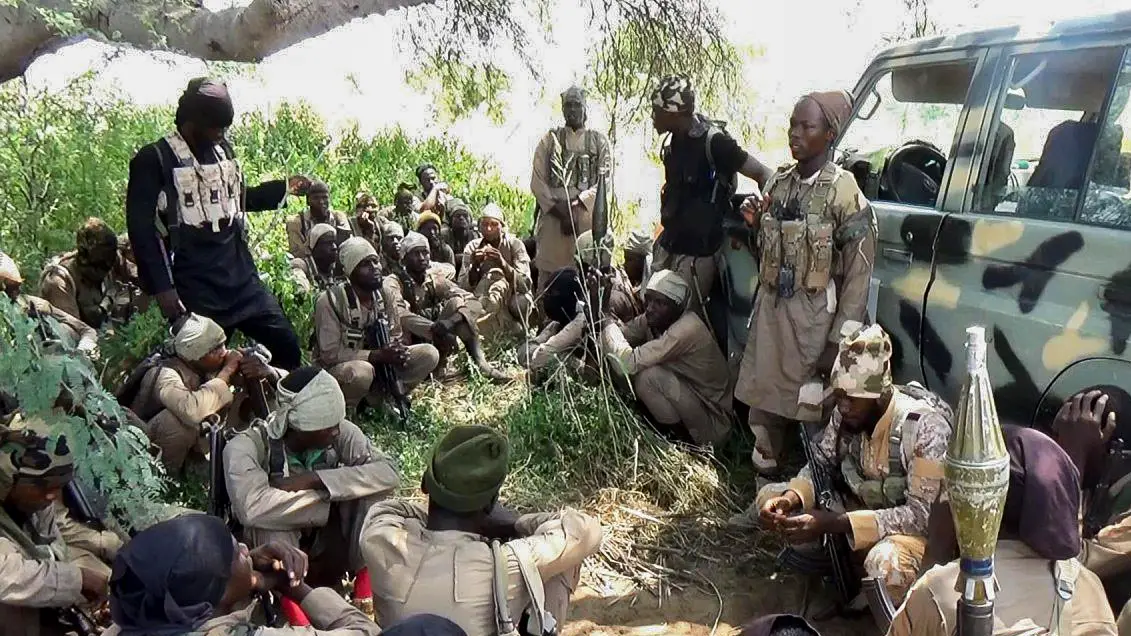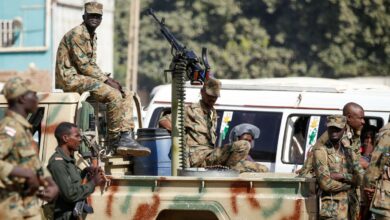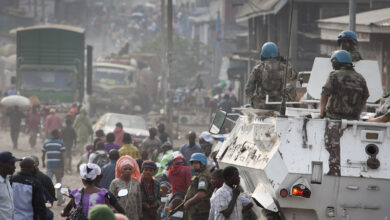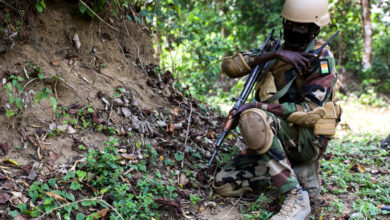Several people were taken hostage and at least one police officer was killed during an attack by militants in the troubled Diffa region of southeastern Niger, a senior official told AFP on Wednesday, April 10.
The attack was later claimed by Islamic State.
Boko Haram militants, some of them believed to be wearing suicide vests, launched the assault on various parts of Diffa city on Tuesday night, and it was “still in progress” Wednesday morning, the official said.
Residents described hearing gunshots and loud explosions near the police station.
According to provisional figures, at least two insurgents were killed, AFP reported.
“The attackers, hunted by the security forces, have holed up in the home of a policeman and taken several people hostage,” the official who wanted to remain anonymous said.
Update April 10 After infiltrating Diffa on Tuesday night, the militants attacked the central police barracks, AFP reported.
“They mainly attacked a group of police,” said the secretary-general of Diffa governorate Yahaya Godi.
After several hours of fighting, the attackers holed up in the home of a police officer and took several people hostage, before blowing themselves up, said Godi and other sources.
It was unclear if the hostages were killed in the blast.
“We do not have a definitive death toll yet,” Godi told AFP.
Two security force members and two jihadists were killed, according to provisional figures, he said.
Without explicitly confirming the attack was over, officials said “sweep operations” were taking place to find possible attackers.
Possible suicide bomb targets such as schools and markets would remain closed for two or three days “as a precaution”, Godi said.
Video shared on social media appeared to show the hostages being released.
https://twitter.com/Impulseur227/status/1115975594095804419
RFI reported that the insurgents attacked a National Gendarmerie camp and that two militants “entrenched themselves in the house of a gendarme and took hostage his family.” The hostages were later rescued by special forces, and the militants killed.
According to RFI, two gendarmes were killed and four injured, and a soldier was injured during the operation to release the hostages.
ActuNiger reported that four assailants wearing suicide vests took part in the attack, three of whom were quickly killed by security forces, while the fourth took the occupants of a gendarme’s house hostage.
According to the report, security forces mounted an operation overnight to deal with the attack which continued until the following day, when the house was raided by security forces. At least two gendarmes including one officer were killed in the initial assault and the subsequent security operation, and several soldiers were injured.
ActuNiger also reported attacks on nearby Tam Abounga and Tam on Tuesday night. The Tam Abounga village chief was killed and burned, and in Tam, two relatives of a local official were kidnapped.
A local NGO said that the village chief of Tam was “slaughtered” and two residents abducted, AFP reported.
ISIS claims Diffa attacks
In a Wednesday statement, ISIS claimed fighters from its Islamic State West Africa province was responsible for the Diffa attack, saying that it was part of “part of the campaign of vengeance for the blessed al-Sham province,” a reference to the group’s territorial losses in Syria.
It said that four inghimasi – suicide commandos – stormed the Diffa headquarters of the Niger border guards, attacking with “small and medium weapons and grenades.”
“The attack continued until this morning, causing the death and wounding of dozens of them and material damage to the building,” the statement said.
It named the four as Abu Saad al-Ansari, Abu Musa al-Qaydoumi, Muhammad al-Ansari and Abu Hamza al-Buhariawi, and later published their images. Caibre Obscura, an account that identifies weaponry, noted on Twitter that two of the four were armed with “Nigerian Special forces-issue AK-74, with Zenitco B10M railed handguard, B33 top cover rail & foregrip.”
ISIS also claimed that ISWA fighters had killed the head of the nearby village and burned his home.
A day earlier, ISIS claimed ISWA fighters on April 8 targeted Diffa airport and a nearby military base with Grad rockets, again as part of the “Vengeance for Sham” campaign, claiming that the attack “resulted in the death and injury of about 20” soldiers.
The Menastream risk consultancy said on Twitter that the Grad rockets landed hundreds of metres from their intended targets and did not cause casualties.
In mid-March, ISIS claimed ISWA militants fired three Grad rockets at Diffa airport. ISIS later published images of what it said were the Grad launches.
The Nigeria-based jihadist group known as Boko Haram split into two factions in mid-2016. One led by long-time leader Shekau is notorious for suicide bombings and indiscriminate killings of civilians. Shekau pledged allegiance to ISIS leader Abu Bakr Al-Baghdadi in March 2015, but ISIS central only gives formal backing to the other faction, which it calls Islamic State West Africa province.
The ISWA faction, which largely focuses on attacking military and government targets, was led by Abu Mus’ab Al-Barnawi, but last month, audio recordings revealed that ISIS appointed Abu Abdullah Idris bin Umar, also known as Ibn Umar al-Barnawi, as leader. ISIS has not yet made a public statement confirming the change.
Recent attacks in Diffa
Boko Haram’s bloody insurgency began in northeastern Nigeria in 2009 but has since spread into neighboring Niger, Chad and Cameroon, prompting a regional military response. More than? 27,000 people have been killed and two million others displaced, sparking a dire humanitarian crisis in the region.
Insurgent attacks on civilians in eastern Niger appear to be increasing, with the Diffa region, near Lake Chad bearing the brunt of recent insurgent attacks, mainly from ISWA.
But ISWA has in the last few weeks been under assault from intensive air and ground offensives from coalition forces around Lake Chad.
The Multinational Joint Task Force, which comprises troops from Chad, Cameroon, Niger and Nigeria, launched Operation Yancin Tafki on February 21. MNJTF spokesperson Colonel Timothy Antigha has said it is aimed at “making islands and other settlements in Lake Chad untenable for Boko Haram Terrorists.”
On March 9, seven police and 38 militants were killed near Gueskerou, according to a government toll. The MNJTF said in a statement that “27 terrorists” were killed.
Islamic State claimed ISWA fighters killed 30 soldiers in a March 9 attack on a military base in Toumour in the Diffa region. Toumour is around 30 km (19 miles) northeast of Gueskerou, and it is unclear whether the ISIS statement referred to the Gueskerou incident or to another attack.
In mid-March ActuNiger reported that ISIS claimed that an ISWA militant carried out a suicide vehicle bomb (SVBIED) attack in Toumour, and that local and security sources confirmed that it occurred
On March 21, eight people were killed in the village of Karidi in Gueskerou district and 14 died in attacks in the Diffa region two days later. Seven villages in the Diffa region were attacked between March 19 and 23, according to reports collated by the Armed Conflict Location & Event Data Project (ACLED).
On March 26, 10 people were killed when gunmen and two female suicide bombers staged a coordinated attack in N’Guigmi in eastern Niger’s Diffa region which the local mayor blamed on Boko Haram. Some local reports put the death toll higher. ActuNiger reported at least 12 people, mostly civilians, were killed and others were missing.
‘Rapid deterioration of the security situation’ in the Lake Chad basin
Warning of a “rapid deterioration of the security situation” in the Diffa region, the United Nations Office for the Coordination of Humanitarian Affairs said on April 4 that at “least 21 attacks against civilians and military forces were recorded in the region in March 2019, with a record of 12 kidnappings and 88 civilian deaths,” marking a significant increase on the 107 people killed in attacks by non-state armed groups in 2018.
It said 18,480 people were displaced towards Diffa town and other large settlements as a result of attacks on N’gagam, Elhaj Mainari, Boula Kiassa in Gueskérou commune, and on Dourou and Koublé in Chetimari commune.
Babar Baloch, spokesperson for UNHCR, the U.N. Refugee Agency, said on Tuesday that “the number of people forcibly displaced within the Diffa region has risen to almost 250,000; almost half of them are refugees from Nigeria who had fled similar attacks and sought refuge across the border.”
Baloch said the UNHCR was trying to relocate around 10,000 refugees “from locations close to the border to the Sayam Forage refugee camp” 45 km away from the border. The camp is already hosting more than 15,000 refugees.”
“Reports also suggest that the latest round of violence is displacing people across the border into Nigeria, including to the towns of Damasak and Maiduguri,” Baloch added. “They are leaving due to fear of the increasing insecurity in the Diffa region, as well as to search for humanitarian assistance.”
With reporting from AFP











